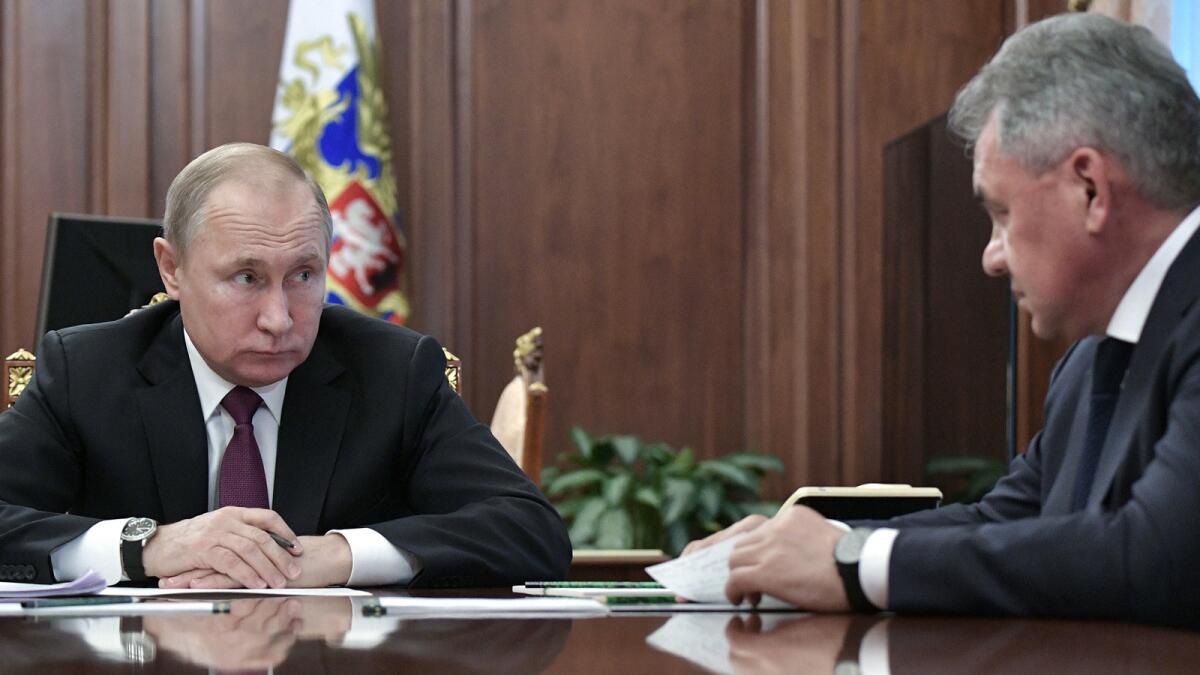Russia will pull the plug on a key nuclear arms pact, following U.S. lead

- Share via
Reporting from MOSCOW — In what Russian President Vladimir Putin called a “tit-for-tat” response, Russia will suspend its participation in a major arms control treaty with the United States and restart the development of intermediate-range missiles banned by the pact, the Kremlin said Saturday.
Russia’s announcement came one day after the U.S. said it would pull out of the 1987 Intermediate-Range Nuclear Forces, a milestone arms control pact that the Trump administration claims Russia has been violating for years.
“We will have a tit-for-tat response,” Putin said in remarks posted on the Kremlin website. “Our American partners have announced that they are suspending their participation in the treaty, so we are suspending ours as well.”
Putin said Russia did not intend to start a new arms race, but added that development of a ground-based, medium-range hypersonic missile that has raised concerns for members of the North Atlantic Treaty Alliance, including the U.S., would continue.
“[The U.S.] announced that they are engaged in research and technological development work, and we will do the same,” Putin said.
The Kremlin leader’s comments came during a special meeting Saturday morning with Russian Defense Minister Sergei Shoigu and Foreign Minister Sergey Lavrov.
The landmark treaty has been a cornerstone of late Cold War-era arms reduction efforts between Moscow and Washington. It was signed in 1987 by U.S. President Ronald Reagan and Soviet leader Mikhail Gorbachev. The pact bans the production, testing and deployment of land-based nuclear and nonnuclear missiles with a range between 500 and 5,500 kilometers, or about 310 and 3,410 miles.
The U.S. has complained that Russia has violated the treaty with the production and deployment of ground-launched cruise missiles capable of reaching Europe with little or no warning.
In the withdrawal announcement Friday, Secretary of State Michael R. Pompeo said the U.S. had given Russia plenty of time to “mend its ways,” but Moscow’s time had run out.
The clock on the U.S. pullout from the pact started on Feb 2., and will fully terminate within six months if Russia does not meet U.S. demands. The U.S. said Russia must verify it has destroyed a new class of medium-range missiles Washington alleges violate the treaty.
The Kremlin has denied the U.S. accusations. In his meeting with his ministers Saturday, Putin said it was the U.S. that was in violation, citing Washington’s positioning of an anti-ballistic missile defense system in Eastern Europe.
Putin said Russia will begin development of a land-based version of its Kalibr cruise missile, a new, hypersonic sea-launched weapon capable of traveling more than five times the speed of sound. NATO has expressed concern about the Kalibr because of the threat it poses to European security.
The Kremlin’s quid pro quo response to the U.S. pullout from the INF treaty comes after almost two years of a tense diplomatic standoff between Washington and Moscow. The tensions stem from U.S. condemnation of Russia’s annexation of Crimea, the Black Sea peninsula Washington and its Western allies recognize as Ukrainian territory.
The U.S. and its European allies have sanctioned Russia for its actions in Ukraine as well as accusations that the Kremlin orchestrated the attempted assassination of a Russian turncoat on British soil. Both Washington and Moscow have expelled diplomats in retaliation.
Putin’s comments that Saturday’s response was a “tit-for-tat” in the ongoing diplomatic tension with Washington overshadowed what many fear could be a revival of a new arms race.
Putin said Russia would go ahead with the development of short- and medium-range missiles now banned by the treaty, but would not deploy the missiles until such American-made weapons appear in Europe or other countries. He blamed the U.S. for refusing to come to the negotiating table despite what he said were repeated overtures from the Kremlin.
“For many years, we have been calling on numerous occasions for holding meaningful disarmament talks on almost all aspects of this matter,” Putin said. “I suggest that we wait until our partners are ready to engage in equal and meaningful dialogue on this subject that is essential for us, as well as for our partners and the entire world.”
More to Read
Sign up for Essential California
The most important California stories and recommendations in your inbox every morning.
You may occasionally receive promotional content from the Los Angeles Times.











